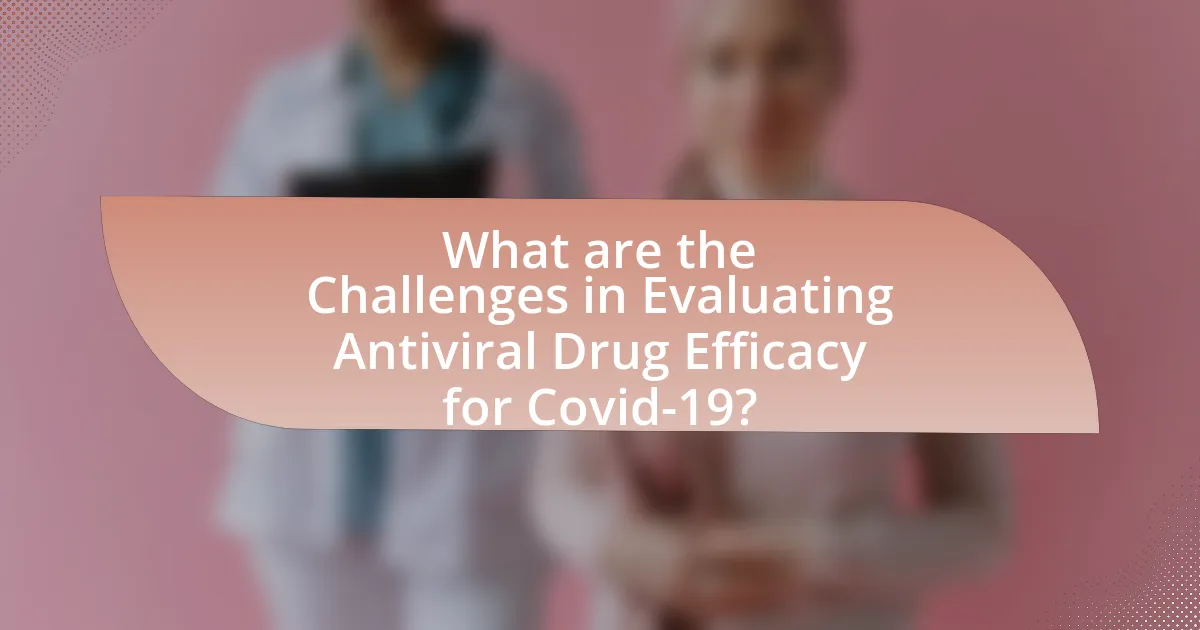Antiviral drugs are specialized medications aimed at treating viral infections by inhibiting virus replication, playing a significant role in the management of Covid-19. This article evaluates the efficacy of various antiviral drugs, including Remdesivir, Molnupiravir, and Paxlovid, highlighting their mechanisms of action, clinical trial results, and the factors influencing their effectiveness. It also distinguishes antiviral drugs from antibiotics, discusses the challenges in evaluating their efficacy, and explores future directions for antiviral drug development in response to emerging variants. Key considerations for optimizing treatment protocols and patient education regarding antiviral therapies are also addressed.

What are Antiviral Drugs and Their Role in Covid-19 Management?
Antiviral drugs are medications specifically designed to treat viral infections by inhibiting the development and replication of viruses. In the context of Covid-19 management, antiviral drugs such as Remdesivir and Molnupiravir have been utilized to reduce the severity and duration of the illness caused by the SARS-CoV-2 virus. Clinical studies have shown that Remdesivir can shorten recovery time in hospitalized patients, while Molnupiravir has demonstrated efficacy in reducing viral load in early-stage infections. These drugs play a crucial role in managing Covid-19 by potentially decreasing hospitalization rates and improving patient outcomes.
How do antiviral drugs function against viral infections?
Antiviral drugs function against viral infections by inhibiting the replication of viruses within host cells. These medications target specific stages of the viral life cycle, such as entry into the host cell, replication of viral genetic material, or assembly and release of new viral particles. For instance, drugs like remdesivir inhibit viral RNA polymerase, thereby preventing the virus from replicating its genetic material, which is crucial for its proliferation. Clinical studies have shown that antiviral treatments can reduce the severity and duration of viral infections, including COVID-19, by limiting the viral load in the body and enhancing the immune response.
What mechanisms do antiviral drugs employ to inhibit virus replication?
Antiviral drugs inhibit virus replication through several mechanisms, including blocking viral entry, inhibiting viral enzymes, and interfering with viral genome replication. For instance, drugs like oseltamivir prevent the release of new viral particles by inhibiting the neuraminidase enzyme, which is crucial for the virus’s ability to spread. Additionally, nucleoside analogs, such as remdesivir, mimic the building blocks of viral RNA, leading to premature termination of viral RNA synthesis. These mechanisms are supported by studies demonstrating the effectiveness of these drugs in reducing viral load and improving patient outcomes in infections like COVID-19.
How do antiviral drugs differ from antibiotics in treating Covid-19?
Antiviral drugs specifically target viruses, such as SARS-CoV-2, the virus responsible for Covid-19, while antibiotics are designed to combat bacterial infections and have no effect on viruses. For instance, antiviral medications like remdesivir and molnupiravir inhibit viral replication, thereby reducing the severity and duration of Covid-19 symptoms. In contrast, antibiotics like amoxicillin are ineffective against viral pathogens and are used solely for bacterial infections, which is why they are not prescribed for Covid-19 treatment. This distinction is crucial in clinical settings, as inappropriate use of antibiotics can lead to antibiotic resistance without providing any benefit for viral infections.
What specific antiviral drugs have been evaluated for Covid-19?
Specific antiviral drugs evaluated for Covid-19 include Remdesivir, Favipiravir, Molnupiravir, and Nirmatrelvir/ritonavir (Paxlovid). Remdesivir, an RNA polymerase inhibitor, was authorized for emergency use based on clinical trials demonstrating reduced recovery time in hospitalized patients. Favipiravir, an antiviral used primarily for influenza, showed some efficacy in early studies but lacked robust evidence for widespread use. Molnupiravir, a novel antiviral, was evaluated for its ability to reduce viral load and was granted emergency use authorization. Nirmatrelvir/ritonavir, a combination therapy, has been shown to significantly reduce the risk of hospitalization or death in high-risk patients. These evaluations are supported by various clinical trials and regulatory assessments, confirming their potential roles in Covid-19 management.
What are the most commonly used antiviral drugs for Covid-19 treatment?
The most commonly used antiviral drugs for Covid-19 treatment are Remdesivir, Molnupiravir, and Paxlovid. Remdesivir, an antiviral medication originally developed for Ebola, has been shown to reduce recovery time in hospitalized Covid-19 patients. Molnupiravir is an oral antiviral that has demonstrated efficacy in reducing the risk of hospitalization or death in high-risk patients. Paxlovid, a combination of nirmatrelvir and ritonavir, has been effective in preventing severe outcomes in Covid-19 patients when administered early in the course of the disease. These drugs have been authorized for emergency use by health authorities based on clinical trial data demonstrating their effectiveness in managing Covid-19.
How effective are these antiviral drugs in clinical trials?
Antiviral drugs have shown varying degrees of effectiveness in clinical trials for COVID-19 management. For instance, remdesivir has demonstrated a reduction in recovery time for hospitalized patients, with a clinical trial indicating a median recovery time of 10 days compared to 15 days for those receiving a placebo. Additionally, molnupiravir has been associated with a 30% reduction in the risk of hospitalization or death in high-risk patients, as shown in the MOVe-OUT trial. These findings underscore the potential of antiviral drugs in improving patient outcomes during COVID-19 treatment.
What factors influence the efficacy of antiviral drugs in Covid-19 management?
The efficacy of antiviral drugs in Covid-19 management is influenced by several key factors, including the timing of administration, the specific viral strain, patient characteristics, and drug mechanisms of action. Timing is critical; antiviral drugs are most effective when administered early in the infection, as evidenced by studies showing reduced viral loads and improved clinical outcomes when treatment begins within the first few days of symptom onset. The specific viral strain, such as variants of SARS-CoV-2, can affect drug effectiveness due to mutations that confer resistance to certain antivirals. Patient characteristics, including age, comorbidities, and immune status, also play a significant role, as individuals with compromised immune systems may respond differently to treatment. Lastly, the mechanisms of action of the antiviral drugs, such as inhibiting viral replication or blocking entry into host cells, determine their overall effectiveness against Covid-19.
How does the timing of antiviral drug administration affect treatment outcomes?
The timing of antiviral drug administration significantly influences treatment outcomes in COVID-19 management. Early administration of antiviral drugs, such as remdesivir, has been shown to reduce viral load and improve clinical outcomes, as evidenced by a study published in the New England Journal of Medicine, which found that patients receiving treatment within the first 10 days of symptom onset had a higher likelihood of recovery compared to those treated later. Delayed administration can lead to increased disease severity and complications, as the viral replication phase may progress unchecked, resulting in a higher risk of hospitalization and mortality. Therefore, timely intervention is crucial for maximizing the efficacy of antiviral therapies in COVID-19 patients.
What role do patient demographics play in the effectiveness of antiviral drugs?
Patient demographics significantly influence the effectiveness of antiviral drugs. Factors such as age, sex, ethnicity, and underlying health conditions can affect drug metabolism, immune response, and overall treatment outcomes. For instance, studies have shown that older adults may experience different pharmacokinetics and pharmacodynamics compared to younger populations, leading to variations in drug efficacy and safety profiles. Additionally, certain ethnic groups may have genetic variations that impact drug metabolism, as seen in the case of the CYP450 enzyme system, which is crucial for the metabolism of many antiviral medications. Therefore, understanding these demographic factors is essential for optimizing antiviral therapy and improving patient outcomes in COVID-19 management.
How do antiviral drugs compare to other treatment options for Covid-19?
Antiviral drugs are specifically designed to target and inhibit the replication of the SARS-CoV-2 virus, making them a focused treatment option for Covid-19. In comparison, other treatment options, such as monoclonal antibodies and corticosteroids, serve different purposes; monoclonal antibodies neutralize the virus, while corticosteroids reduce inflammation in severe cases. Clinical studies, such as those published in the New England Journal of Medicine, have shown that antiviral drugs like remdesivir can shorten recovery time in hospitalized patients, while corticosteroids like dexamethasone have been proven to reduce mortality in severe cases. Thus, antiviral drugs provide a direct mechanism against the virus, while other treatments may address symptoms or complications associated with Covid-19.
What are the advantages and disadvantages of using antiviral drugs versus monoclonal antibodies?
Antiviral drugs and monoclonal antibodies each have distinct advantages and disadvantages in the treatment of viral infections, including COVID-19. Antiviral drugs, such as remdesivir, can inhibit viral replication and are often administered early in the infection, potentially reducing the severity and duration of illness. However, their effectiveness can be limited by the emergence of drug-resistant viral strains and they may have side effects, such as liver toxicity.
Monoclonal antibodies, like casirivimab and imdevimab, provide targeted therapy by neutralizing the virus and are particularly effective in high-risk patients when administered early. Their disadvantages include high costs, the need for intravenous administration, and potential allergic reactions. Additionally, their efficacy may diminish against certain variants of the virus.
In summary, antiviral drugs offer broad antiviral activity but face challenges with resistance and side effects, while monoclonal antibodies provide targeted treatment but come with higher costs and administration complexities.
How do antiviral drugs integrate into a comprehensive Covid-19 treatment plan?
Antiviral drugs are a critical component of a comprehensive Covid-19 treatment plan, as they target the virus directly to reduce its replication and severity of the disease. These medications, such as remdesivir and molnupiravir, are administered to patients with moderate to severe Covid-19 to shorten recovery time and decrease the risk of hospitalization. Clinical trials have demonstrated that remdesivir can lead to a statistically significant reduction in recovery time for hospitalized patients, supporting its inclusion in treatment protocols. Furthermore, antiviral drugs are often used in conjunction with other therapeutic approaches, such as monoclonal antibodies and supportive care, to enhance overall patient outcomes and manage symptoms effectively.

What are the Challenges in Evaluating Antiviral Drug Efficacy for Covid-19?
Evaluating antiviral drug efficacy for Covid-19 faces several challenges, including variability in patient responses, the emergence of viral variants, and the complexity of clinical trial designs. Patient variability arises from differences in immune responses, comorbidities, and timing of treatment initiation, which can affect outcomes. The emergence of viral variants can alter the effectiveness of antiviral drugs, complicating efficacy assessments. Additionally, clinical trial designs must account for factors such as appropriate control groups, endpoints, and the timing of drug administration, which can further complicate the evaluation process. These challenges necessitate robust methodologies and adaptive trial designs to accurately assess antiviral efficacy in the context of Covid-19.
What limitations exist in current clinical trials for antiviral drugs?
Current clinical trials for antiviral drugs face several limitations, including small sample sizes, lack of diverse populations, and short study durations. Small sample sizes can lead to insufficient statistical power to detect meaningful effects, while a lack of diversity may result in findings that are not generalizable to the broader population. Additionally, short study durations may not capture long-term efficacy and safety data, limiting the understanding of the drug’s impact over time. These limitations hinder the ability to draw definitive conclusions about the effectiveness of antiviral drugs in managing COVID-19.
How do variations in study design impact the assessment of drug efficacy?
Variations in study design significantly impact the assessment of drug efficacy by influencing the reliability and validity of the results. For instance, randomized controlled trials (RCTs) are considered the gold standard as they minimize bias and allow for causal inferences, while observational studies may introduce confounding factors that can skew results. A systematic review published in the Journal of Clinical Epidemiology highlighted that RCTs provide more robust evidence for drug efficacy compared to non-randomized studies, which often report inflated effect sizes due to selection bias. Additionally, the choice of endpoints, sample size, and duration of the study can also affect the perceived efficacy of antiviral drugs in managing COVID-19, as demonstrated in various clinical trials where differing methodologies led to varying conclusions about the same drug.
What challenges arise from the emergence of viral variants in efficacy evaluations?
The emergence of viral variants presents significant challenges in efficacy evaluations of antiviral drugs. These variants may exhibit altered biological characteristics, such as increased transmissibility or resistance to neutralization by antibodies, which can lead to reduced effectiveness of existing treatments. For instance, studies have shown that variants like Delta and Omicron have demonstrated varying levels of resistance to neutralizing antibodies generated by vaccines and previous infections, complicating the assessment of drug efficacy. Additionally, the rapid evolution of these variants can outpace the timelines of clinical trials, making it difficult to obtain relevant data on drug performance against the most current strains. This dynamic landscape necessitates continuous monitoring and adaptation of evaluation methodologies to ensure accurate assessments of antiviral efficacy.
How do regulatory approvals affect the availability of antiviral drugs?
Regulatory approvals significantly impact the availability of antiviral drugs by determining the timeline and conditions under which these medications can be marketed and distributed. Regulatory agencies, such as the U.S. Food and Drug Administration (FDA) and the European Medicines Agency (EMA), evaluate the safety and efficacy of antiviral drugs through rigorous clinical trials before granting approval. For instance, the expedited approval process during the COVID-19 pandemic allowed for the rapid availability of antiviral treatments like remdesivir, which received Emergency Use Authorization in May 2020 after demonstrating efficacy in clinical trials. This regulatory framework ensures that only drugs meeting specific safety and efficacy standards reach the market, directly influencing their availability to healthcare providers and patients.
What criteria do regulatory bodies use to evaluate antiviral drugs for Covid-19?
Regulatory bodies evaluate antiviral drugs for Covid-19 based on criteria such as safety, efficacy, quality, and manufacturing standards. Safety assessments involve analyzing adverse effects and tolerability in clinical trials, while efficacy is determined through randomized controlled trials that demonstrate the drug’s ability to reduce viral load or improve clinical outcomes. Quality criteria ensure that the drug meets established standards for purity and potency, and manufacturing standards focus on compliance with Good Manufacturing Practices (GMP). For instance, the U.S. Food and Drug Administration (FDA) requires substantial evidence from clinical trials to support these evaluations, as seen in the Emergency Use Authorization process for drugs like remdesivir and molnupiravir.
How do emergency use authorizations influence drug accessibility during pandemics?
Emergency use authorizations (EUAs) significantly enhance drug accessibility during pandemics by allowing expedited approval of treatments that have not yet completed the full regulatory review process. This mechanism enables healthcare providers to access potentially life-saving medications more quickly, as seen during the COVID-19 pandemic when the U.S. Food and Drug Administration issued EUAs for several antiviral drugs, including remdesivir and monoclonal antibodies. The rapid deployment of these treatments under EUAs facilitated timely patient care and contributed to improved health outcomes, demonstrating the critical role of EUAs in addressing urgent public health needs.

What are the Future Directions for Antiviral Drug Development in Covid-19 Management?
Future directions for antiviral drug development in COVID-19 management include the exploration of novel antiviral compounds, the optimization of existing therapies, and the integration of combination therapies. Research is focusing on broad-spectrum antivirals that can target multiple coronaviruses, as well as the development of drugs that can be administered early in the infection to prevent severe disease. For instance, the use of monoclonal antibodies and small molecule inhibitors is being investigated to enhance efficacy. Additionally, ongoing clinical trials are assessing the safety and effectiveness of these new agents, with the aim of establishing robust treatment protocols. The urgency of addressing emerging variants also drives the need for adaptive clinical trial designs to quickly evaluate antiviral efficacy against new strains.
What ongoing research is being conducted on new antiviral agents for Covid-19?
Ongoing research on new antiviral agents for Covid-19 includes multiple clinical trials evaluating the efficacy of compounds such as molnupiravir and nirmatrelvir/ritonavir. For instance, the study titled “Efficacy of Molnupiravir in Patients with Covid-19” published in the New England Journal of Medicine in 2021 demonstrated that molnupiravir significantly reduced the risk of hospitalization or death in high-risk patients. Additionally, research on nirmatrelvir/ritonavir, known as Paxlovid, has shown promising results in reducing viral load and improving recovery times in Covid-19 patients, as reported in a study by the National Institutes of Health. These investigations are crucial for identifying effective antiviral treatments to manage Covid-19.
How are researchers addressing the challenge of viral resistance in drug development?
Researchers are addressing the challenge of viral resistance in drug development by employing combination therapies that target multiple viral pathways simultaneously. This approach reduces the likelihood of the virus developing resistance to a single drug, as evidenced by studies showing that using a combination of antiviral agents can significantly enhance treatment efficacy against resistant strains. For instance, the use of remdesivir in conjunction with other antiviral drugs has demonstrated improved outcomes in clinical trials, highlighting the effectiveness of this strategy in managing viral infections, including COVID-19.
What innovative approaches are being explored to enhance antiviral efficacy?
Innovative approaches being explored to enhance antiviral efficacy include the development of broad-spectrum antivirals, the use of monoclonal antibodies, and the application of CRISPR technology for targeted viral genome editing. Broad-spectrum antivirals aim to target multiple viruses, increasing treatment options; for instance, favipiravir has shown efficacy against various RNA viruses. Monoclonal antibodies, such as those developed by Regeneron and Eli Lilly, have demonstrated significant effectiveness in neutralizing SARS-CoV-2. Additionally, CRISPR technology is being investigated for its potential to disrupt viral replication by precisely targeting viral RNA, as evidenced by studies published in journals like Nature Biotechnology. These approaches reflect a shift towards more versatile and targeted antiviral strategies in response to emerging viral threats.
What best practices should be followed in the use of antiviral drugs for Covid-19?
The best practices for using antiviral drugs for Covid-19 include timely administration, appropriate dosing, and monitoring for side effects. Timely administration is crucial, as antiviral drugs like remdesivir are most effective when given early in the course of the disease, ideally within the first 10 days of symptom onset. Appropriate dosing must be adhered to, following guidelines established by health authorities such as the World Health Organization, which recommend specific dosages based on clinical trials demonstrating efficacy. Monitoring for side effects is essential to ensure patient safety, as antiviral treatments can have adverse effects that require management. These practices are supported by clinical evidence showing improved outcomes in patients receiving antiviral therapy when these guidelines are followed.
How can healthcare providers optimize antiviral treatment protocols for patients?
Healthcare providers can optimize antiviral treatment protocols for patients by implementing personalized medicine approaches that consider individual patient factors such as age, comorbidities, and viral load. Tailoring antiviral therapies based on these factors has been shown to enhance treatment efficacy and minimize adverse effects. For instance, studies indicate that early intervention with antivirals like remdesivir significantly improves outcomes in high-risk populations, demonstrating a 31% faster recovery compared to placebo in hospitalized patients. Additionally, continuous monitoring of emerging variants and their susceptibility to existing antivirals allows healthcare providers to adjust treatment protocols accordingly, ensuring the most effective therapeutic strategies are employed.
What considerations should be made for patient education regarding antiviral therapies?
Patient education regarding antiviral therapies should prioritize understanding the medication’s purpose, dosage, potential side effects, and adherence to the treatment regimen. Clear communication about how antiviral drugs work, such as inhibiting viral replication, is essential for patients to grasp their role in managing infections like COVID-19. Additionally, educating patients on the importance of completing the full course of therapy, even if symptoms improve, helps prevent resistance and ensures optimal efficacy. Evidence shows that informed patients are more likely to adhere to treatment plans, which can significantly improve health outcomes. For instance, studies indicate that adherence to antiviral therapy can reduce hospitalization rates and improve recovery times in COVID-19 patients.


